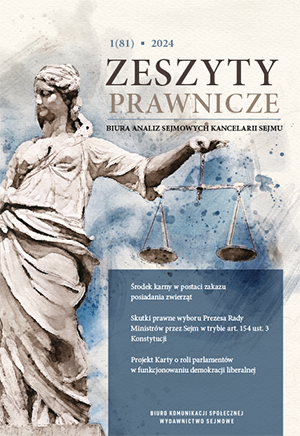Skutki prawne wyboru Prezesa Rady Ministrów przez Sejm w trybie art. 154 ust. 3 Konstytucji
Legal consequences of the the election of the Prime Minister by the Sejm of the Republic of Poland pursuant to Article 154 para. 3 of the Constitution of the Republic of Poland
Author(s): Jacek ZaleśnySubject(s): Politics / Political Sciences, Politics, Constitutional Law, Government/Political systems, Electoral systems
Published by: Kancelaria Sejmu
Keywords: Council of Ministers; Prime Minister; Constitution; President; executive power; legislative power
Summary/Abstract: The subject of the analysis is an attempt to answer the question of whether the election of the Prime Minister by the Sejm under Article 154 para. 3 of the Constitution of the Republic of Poland means that the President automatically assumes office, and whether, if this provision is applied, the President takes the oath of office only from members of the Council of Ministers or also from the Prime Minister. The author states that Deputies are the representatives of the Nation, while the President serves as the highest representative of the Republic of Poland, but does not represent the Nation, which determines the competence of these bodies. The relationships between the legislative and executive powers presented in the analysis illustrate the principles of the parliamentary-cabinet system in Poland and explain the significance of these powers in the different modes of appointment of the Prime Minister.
Journal: Zeszyty Prawnicze BAS
- Issue Year: 81/2024
- Issue No: 1
- Page Range: 129-138
- Page Count: 10
- Language: Polish

